In this article:
Chocolate is a type of candy made from the beans of the cocoa plant. The cocoa beans are harvested, cleaned, roasted, and shelled, after which they are referred to as cocoa nibs.
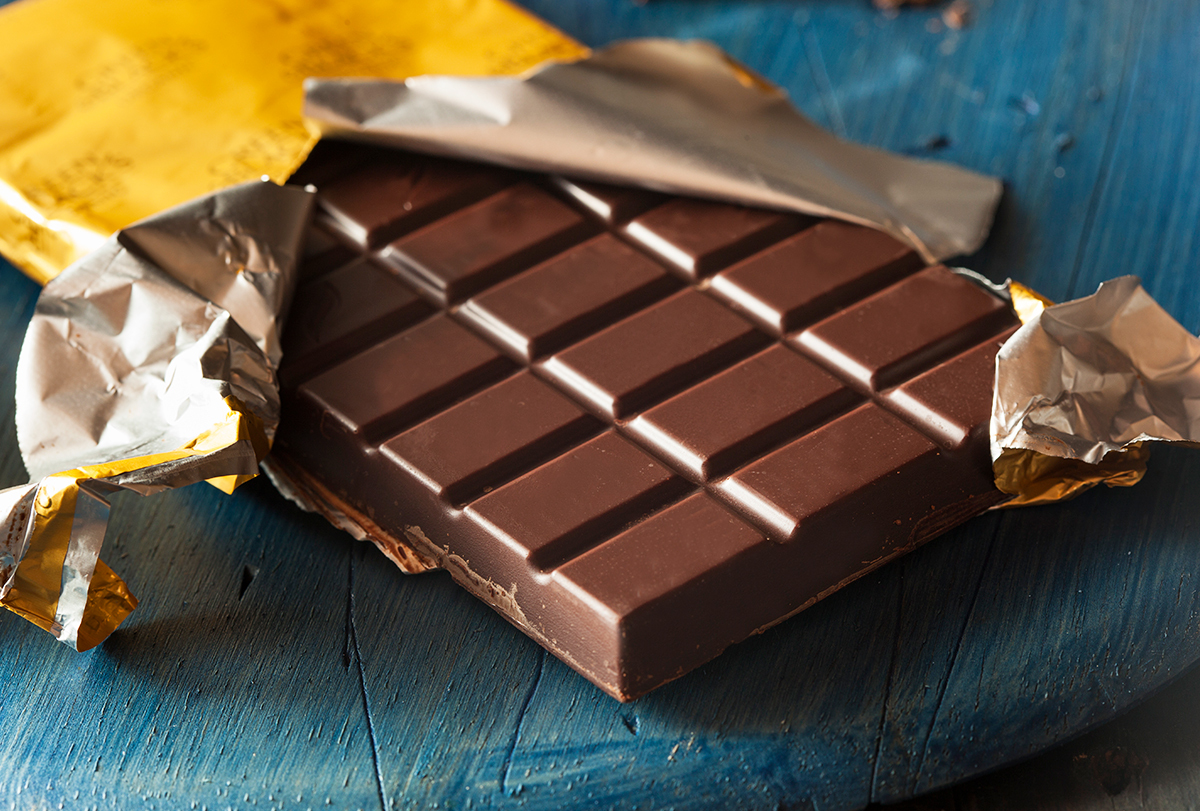
The cocoa nibs are then ground and refined to yield cocoa liquor, which can be used to manufacture cocoa powder and chocolate. Milk, sugar, and other ingredients are then added to a second refining process to yield chocolate. (1)
Benefits of Consuming Dark Chocolate
Dark chocolate contains various active components such as anthocyanidins, proanthocyanidins, and catechins, which contribute to the bitter flavor of dark chocolate. (2)
Moderate dark chocolate consumption of 6 servings or less per week is found to lower the risk of coronary heart disease, diabetes, and stroke. (3)
With its various nutritional benefits, dark chocolate can promote health in the following ways.
1. Provides anti-inflammatory effects
Cocoa bean figures at the top of the most antioxidant-rich foods in terms of therapeutic potential. (4)
Antioxidants are known for their ability to fight free radicals in the body and reduce inflammation, which can otherwise lead to chronic diseases such as cardiovascular disease, metabolic disorder, and various cancers.
2. Supports digestive health
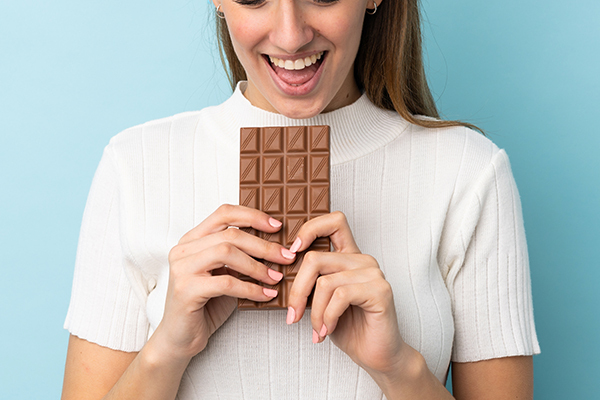
Dark chocolate can help stimulate the gallbladder, induce stomach contractions, and increase overall motility. (5) These effects may aid in the prevention of gallbladder stasis. (5)
Dark chocolate and its polyphenols may also increase healthy gut bacteria and decrease inflammation in the bowel. (6) While preliminary research supports the use of dark chocolate for gastrointestinal health, more studies are needed to establish its effects.
3. Controls blood pressure
Some of the polyphenols in dark chocolate aid in the production of nitric oxide, which is known as a powerful vasodilator and has been shown to lower blood pressure. (7)
People who suffer from hypertension (high blood pressure) may eat dark chocolate but in appropriate amounts. They must also be mindful of its inherent fat and sodium content.
4. Acts as an aphrodisiac
Dark chocolate is considered to be an aphrodisiac. However, human research conducted on this topic was observational, making this claim rather subjective. (8)
The nitrogenous compounds of caffeine and theobromine are thought to induce a pleasant feeling. Unsaturated N-acylethanolamines, another component of dark chocolate and cocoa powder, mimic cannabinoids.
5. Improves cognition
The flavonoid content in dark chocolate can help improve cognitive function in healthy people and those with cognitive impairment. (9)(10) A study found that moderate consumption of dark chocolate helps increase brain activity, especially in the temporo-occipital leads. (11)
6. May help with PMS symptoms
Chocolate cravings in women tend to increase about a week to 4 days before their menstrual period. (12) However, this craving is not uniform among women of all cultures. (13)
Popular theories in research suggest that these chocolate cravings are linked to the changes that occur with the menstrual cycle.
While chocolate is anecdotally said to help relieve PMS symptoms, there has only been little research conducted on it. (12) Other areas of research have mentioned that dark chocolate may act as a cannabinoid and help improve your mood. (14)
7. May aid weight loss
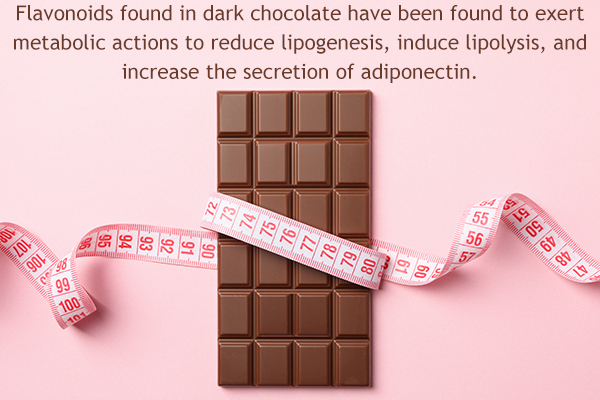
There are mixed results in the research on the effect of dark chocolate and weight loss. The smell of dark chocolate may promote early satiety, thus lowering the risk of weight gain. (15)
Flavonoids found in dark chocolate have been found to exert metabolic actions to help reduce the deposition of fat and insulin resistance and, therefore, may be considered good for weight loss. (16)
8. May help reduce cholesterol
It has been found that dark chocolate intake can lead to considerable reductions in total cholesterol and LDL cholesterol levels without affecting the HDL cholesterol levels. (17)
However, this effect is rather short-lived, which is why dark chocolate cannot serve as a substitute for standard cholesterol-lowering medications. (17)
ALSO READ: Foods to Lower Your Cholesterol Levels
9. May help prevent sun damage
Chocolate is credited with sun-protective properties due to its polyphenolic content.
Studies have shown that polyphenols may help mitigate the harmful effects of ultraviolet radiation on the skin and thereby reduce sun damage. (18) While that may be true, a recent 2019 literature review dismissed the use of dark chocolate for sun protection despite its polyphenolic content. (19)(20)
Given the conflicting evidence, one cannot attach great value to dark chocolate for fighting sun damage, more research is warranted.
Buying the Right Kind of Dark Chocolate
When buying dark chocolate, keep these points in mind to reap its health benefits:
- Dark chocolate should have a high percentage of cocoa or cocoa bean solids.
- Look for chocolate bars with 70% or higher cocoa content, and review the nutrition label and ingredients list. Ingredients are listed by weight, so the first ingredients listed should be chocolate, cocoa, or cacao.
- Products labeled as Dutch cocoa undergoes a different process from other cocoa products and are found to contain fewer polyphenols.
- Cocoa nibs, which are products of the second stage of processing from the cocoa bean, can be purchased and added to smoothies or desserts. However, be warned that they are very bitter in comparison to manufactured chocolate.
Dark Chocolate for Diabetics
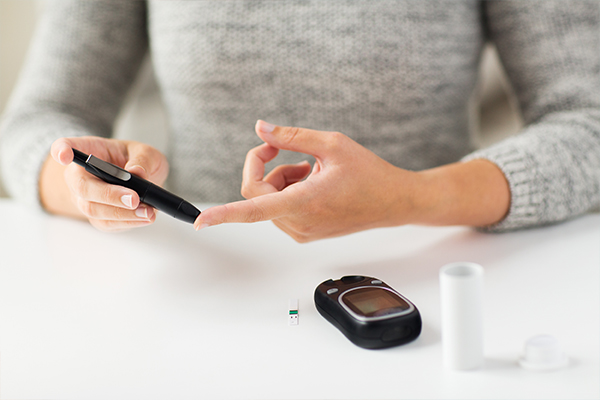
Those who have diabetes can eat dark chocolate. Dark chocolate should be treated as any other dessert food, and grams of carbohydrate should be accounted for. (21)
Depending on gender, age, and activity level, people with diabetes are typically advised to eat 45–60 g carbohydrates at each meal.
Dark chocolate loaded with polyphenols may improve glucose homeostasis and insulin sensitivity and may even lower the risk of gestational diabetes when consumed as part of an overall high-flavonoid diet.
These flavonoids are thought to improve the function and integrity of the beta cells on the pancreas in type 2 diabetes. (22)
ALSO READ: Healthy and Harmful Foods for Diabetics
Can Dark Chocolate Be Consumed Every Day?
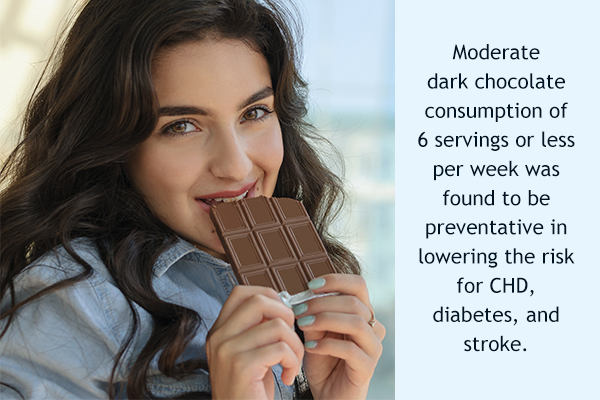
It is best to consume dark chocolate when you are craving something sweet.
Dark chocolate’s rich flavor is known to increase satiety, which may, in turn, help reduce cravings or consumption of other sweets high in sugar and saturated fats. If you are healthy and eat a well-balanced diet that includes dark chocolate in moderation, generally less than 6 servings a week, there should be no side effects.
Overconsumption of chocolate can, however, lead to excess calories, excess sugar intake, and excess fat intake, which can increase the risk of cardiovascular disease, diabetes, and obesity over time.
Final Word
Dark chocolate is loaded with polyphenols that possess various health benefits. Therefore, moderate consumption of dark chocolate can have a positive impact on your health, including improvements in digestion, blood pressure, and even mood. However, avoid overconsumption of dark chocolate as it can lead to weight gain.
- Was this article helpful?
- YES, THANKS!NOT REALLY


